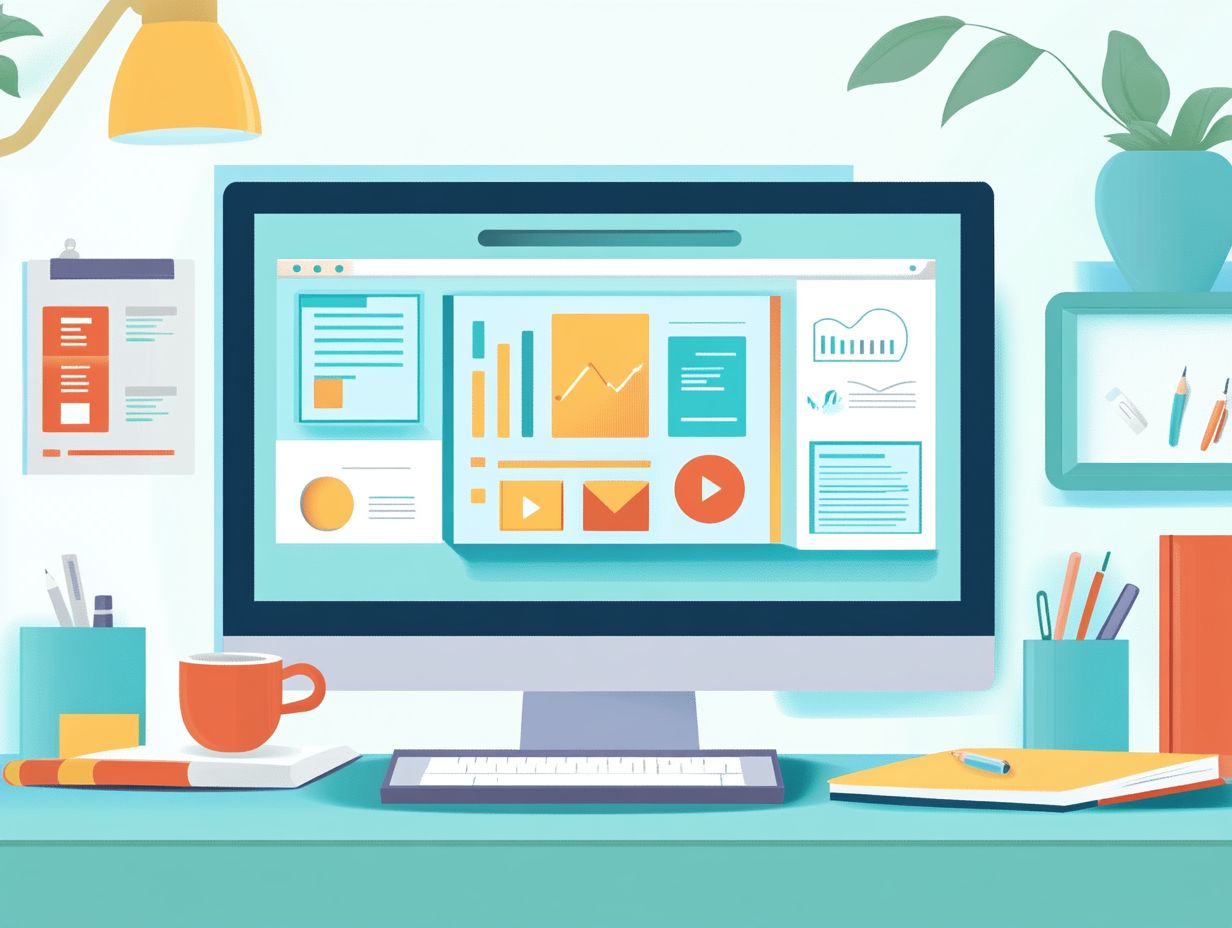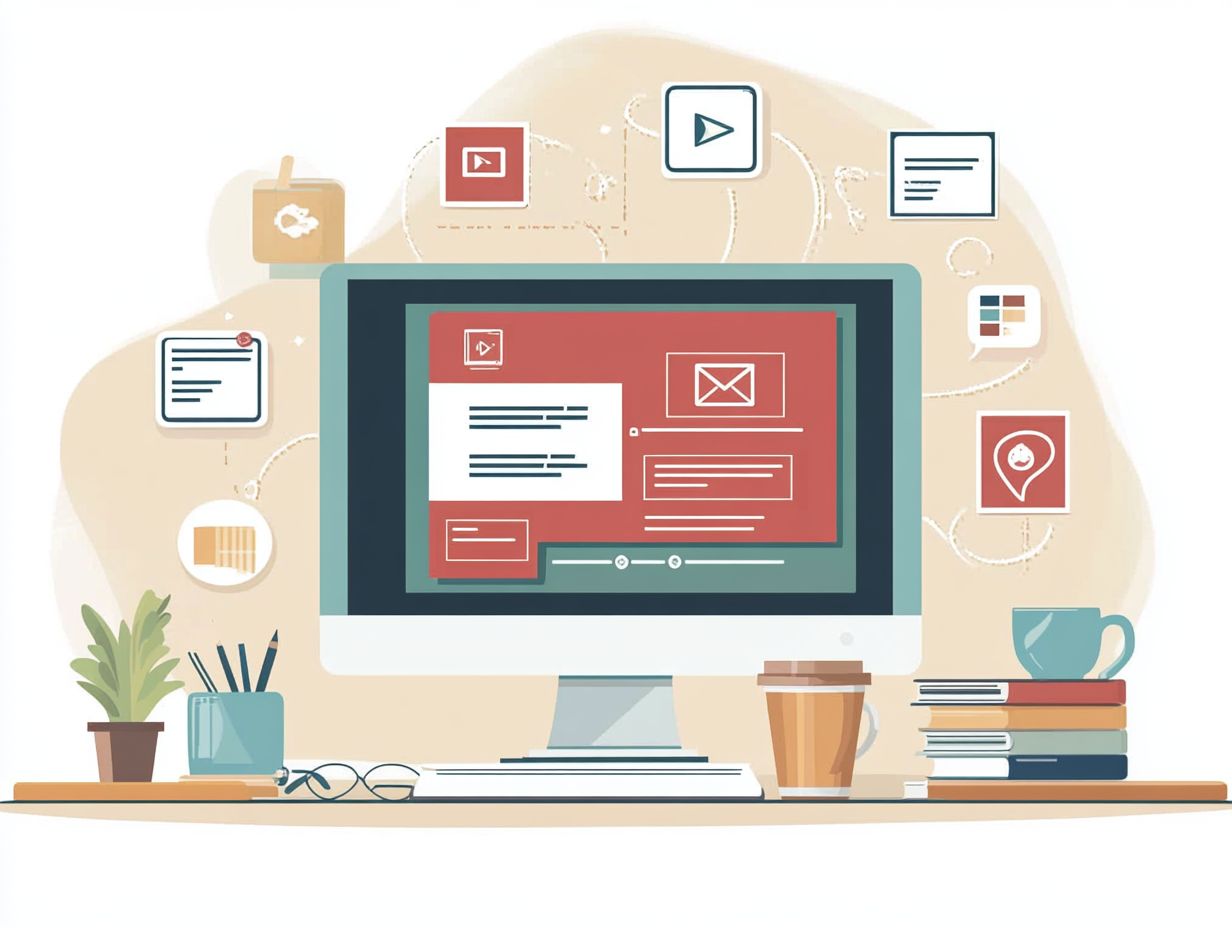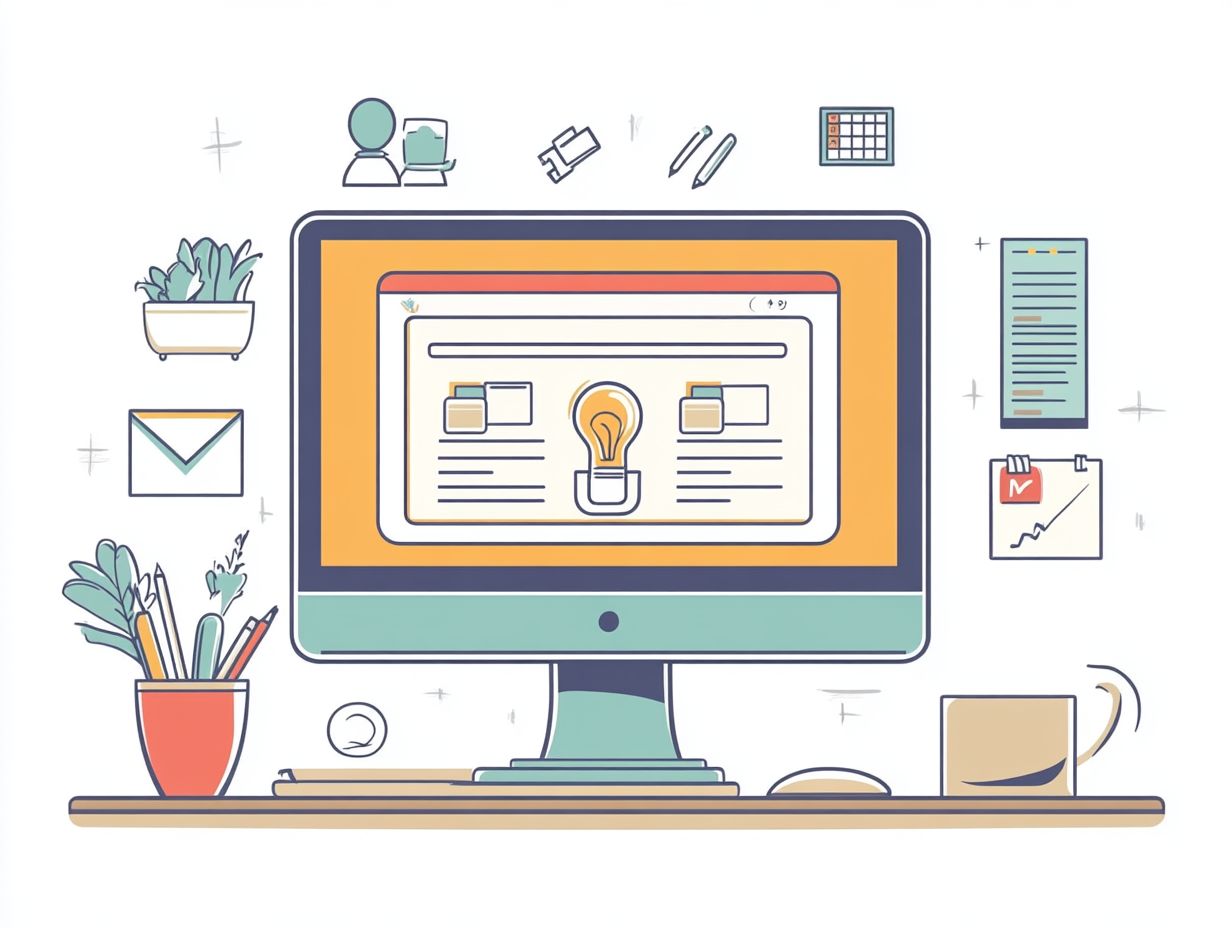“10 Tools to Help Train CRM Users Effectively”
Effective CRM training unlocks the full potential of your customer relationship management system. This article explores ten powerful tools and strategies to transform your team s training experience!
This article delves into ten impactful tools and strategies that can revolutionize the way you train your team. From crafting structured training plans to leveraging online platforms and facilitating engaging hands-on sessions, each approach is tailored to enhance both learning and retention.
We tackle common challenges while underscoring the advantages of investing in comprehensive CRM training. Prepare to elevate your training program to new heights!
Contents
- Key Takeaways:
- 1. Create a Training Plan
- 2. Utilize Online Training Platforms
- 3. Host Webinars or Virtual Training Sessions
- 4. Provide Hands-On Training
- 5. Use Real-Life Scenarios
- 6. Encourage Self-Learning
- 7. Offer Incentives for Completion
- 8. Provide Ongoing Support and Resources
- 9. Utilize Gamification Techniques
- 10. Allow Users to Ask Questions and Provide Feedback
- How Can a Business Measure the Effectiveness of CRM Training?
- What Are the Common Challenges in Training CRM Users?
- What Are the Key Features to Look for in a CRM Training Tool?
- How Can a Business Ensure Consistency in CRM Training?
- What Are the Benefits of Investing in CRM Training for Employees?
- How Can a Business Continuously Improve Their CRM Training Program?
- Frequently Asked Questions
- What are some tools that can help effectively train CRM users?
- What is the purpose of using these tools for CRM user training?
- How can interactive training platforms be used to train CRM users?
- Are there any free resources available for training CRM users?
- Are there any tools specifically designed for training CRM users on mobile devices?
- Can these tools be used to train a large number of CRM users at once?
Key Takeaways:

Develop a solid training plan to onboard and educate CRM users effectively.
Use online platforms to create flexible and interactive learning experiences.
Incorporate real-life scenarios and hands-on training to apply knowledge practically.
1. Create a Training Plan
Creating a comprehensive training plan is essential for maximizing the effectiveness of CRM software within your organization. This approach ensures that every team member is well-versed in the principles and practices of customer relationship management, driving business growth and enhancing sales productivity.
To craft an effective training framework, begin by defining clear objectives that align with your organization’s overall goals. This involves mapping out a curriculum that covers various features of CRM tools like Salesflare, monday.com, or Salesforce.
Scheduling sessions at regular intervals is crucial for reinforcing learning. This ensures your employees feel confident with the software. By integrating these CRM tools into daily operations, you’re giving your teams the power to manage customer data more efficiently.
A well-structured training plan boosts individual proficiency and streamlines data management. This fosters collaboration across departments, leading to improved productivity and stronger customer relationships.
2. Utilize Online Training Platforms
Utilizing online training platforms is a highly effective strategy for onboarding employees to CRM tools. It grants them flexible access to knowledge and resources specifically tailored for software as a service (SaaS).
Platforms like HubSpot Academy provide extensive courses designed to deepen understanding of essential functionalities while addressing specific features of popular CRM software such as Zoho and Pipedrive.
Customer engagement is crucial during these training sessions not only to ensure that employees grasp the necessary information but also to foster interactivity through quizzes and hands-on exercises.
This immersive approach encourages teams to apply concepts in real-world scenarios, equipping them with the skills needed to leverage CRM tools effectively and drive business growth.
3. Host Webinars or Virtual Training Sessions
Hosting webinars or virtual training sessions offers a dynamic opportunity to engage employees in real-time learning about customer relationship management and effective use of CRM tools.
These interactive platforms allow participants to receive immediate feedback and clarification on complex features, significantly enhancing the learning experience.
Live demonstrations during these sessions enable users to observe CRM functionalities in action, promoting a deeper understanding and retention of information.
This format encourages open dialogue, allowing attendees to ask questions that address their specific concerns, ultimately leading to improved customer support.
By enhancing communication, you can ensure your teams are well-equipped to utilize CRM systems effectively, driving both efficiency and customer satisfaction.
Start implementing these strategies today to see immediate results!
4. Provide Hands-On Training
Providing hands-on training is crucial for developing a practical understanding of CRM software. This approach allows you to apply your knowledge directly, enhancing customer experience and satisfaction.
Implementing interactive workshops can be particularly effective. They encourage you to engage with the software in real-world scenarios, making learning more impactful.
Simulations that mimic actual customer interactions are invaluable, giving you the chance to practice problem-solving and decision-making skills in a controlled environment.
Tools like Freshsales or Salesforce simplify the creation of immersive experiences, offering features that instructors can utilize for role-playing exercises and group activities.
By leveraging these training tools, you empower your team to gain the confidence needed for effective customer relationship management, ultimately driving performance and productivity.
5. Use Real-Life Scenarios
Incorporating real-life scenarios into your CRM training can significantly elevate your learning experience by providing relatable contexts for lead management and client communication strategies.
Picture this: you engage in role-playing exercises that simulate handling customer inquiries or resolving complaints. Imagine a scenario where a customer expresses dissatisfaction with a product; a thoughtfully designed training session could guide you on how to leverage CRM tools to access customer history, pinpoint pain points, and craft tailored responses.
This hands-on experience makes learning thrilling and reinforces essential principles of effective engagement, boosting your confidence in applying these strategies. These relatable scenarios create a more memorable learning journey, enhancing your retention of training concepts and leading to improved performance in real-world interactions.
6. Encourage Self-Learning

Encouraging self-learning among your employees is essential for maximizing the effectiveness of CRM software. This approach promotes ongoing learning, significantly enhancing productivity and efficiency in customer interactions.
When your team members take the initiative to explore resources like online courses and tutorials focused on marketing automation, they not only expand their skill sets but also uncover innovative ways to leverage CRM tools in their daily tasks.
This self-driven pursuit leads to more personalized customer experiences, streamlining communication and elevating overall customer satisfaction.
By providing access to platforms such as HubSpot Academy or LinkedIn Learning, you empower your team to learn at their own pace, keeping them engaged and attuned to the latest industry trends. By placing a premium on self-learning, you cultivate a more adaptable workforce, well-prepared to navigate evolving challenges and fully harness the potential of your CRM systems.
7. Offer Incentives for Completion
Offering incentives for completing CRM training programs can significantly elevate your employees’ motivation and commitment to mastering customer relationship management processes.
Implementing a variety of rewards such as certificates of completion, tangible bonuses, or recognition through employee acknowledgment programs cultivates a more engaging atmosphere within your organization.
These incentives encourage training completion and foster a sense of accomplishment and loyalty toward the company s objectives.
When you certify employees, you enhance their skill sets, leading to improved performance in managing customer relationships.
When your staff members feel valued whether through reward systems or public recognition they’re more likely to invest greater effort, resulting in a notable boost in overall business management effectiveness.
8. Provide Ongoing Support and Resources
Ongoing support and resources are crucial for retaining and applying your CRM training. This helps elevate customer service and enhance overall CRM effectiveness.
Follow-up training sessions and refresher courses reinforce key concepts and boost your skills.
Access to updated CRM tools, like Zoho CRM or Pipedrive, is essential. These platforms frequently introduce new features that streamline your workflows.
A strong support system empowers you to ask questions and seek help whenever needed. This not only enhances your performance but also builds a cohesive team that meets customer needs effectively.
9. Utilize Gamification Techniques
Using gamification techniques in your CRM training can significantly elevate engagement and motivation among employees. Imagine transforming your training into an exciting adventure!
By embracing various strategies like reward systems that allow participants to earn points or badges for completing modules you can cultivate a dynamic learning environment.
Interactive challenges that mimic real-world scenarios deepen understanding and encourage practical application of concepts.
These approaches make training sessions more captivating and enhance knowledge retention. Employees are more likely to remember information when it s linked to a fun and competitive atmosphere.
Ultimately, incorporating gamified elements can revolutionize traditional training into an immersive experience that fosters continuous learning and development.
10. Allow Users to Ask Questions and Provide Feedback
Allowing you to ask questions and provide feedback during CRM training creates an open environment that enhances your learning experience.
This approach helps you voice your concerns confidently, which is essential for identifying specific difficulties.
By incorporating structured Q&A sessions into the training agenda, facilitators offer valuable opportunities to clarify uncertainties.
Implementing feedback mechanisms, like surveys and real-time polls, enables continuous collection of insights from you and your peers.
These insights can be analyzed to refine training materials and methods, ensuring they align better with your needs and lead to more effective knowledge retention.
How Can a Business Measure the Effectiveness of CRM Training?
Measuring the effectiveness of your CRM training is essential for enhancing your customer relationship management strategies. This significantly influences sales productivity and overall business growth.
To conduct a thorough evaluation, you can utilize various metrics, including employee performance indicators that reflect how well your team applies the skills they’ve learned.
Gathering customer feedback is vital for assessing satisfaction levels and understanding the impact of CRM practices on customer relationships.
By analyzing sales outcomes after training, you gain concrete data on revenue improvements and customer retention rates.
Scrutinizing these measurements allows you to pinpoint areas that require further development, empowering your workforce and fostering sustainable growth through more effective customer interactions.
What Are the Common Challenges in Training CRM Users?

Training CRM (Customer Relationship Management) users often comes with challenges, such as varying skill levels, resistance to change, and the struggle to keep customers engaged throughout the learning process.
These hurdles can hinder your use of CRM tools, ultimately impacting organizational performance. To overcome these challenges, it s essential to implement targeted training solutions that cater to diverse learning styles while providing ongoing support.
Crafting engaging, hands-on training modules that encourage practical application can help users build confidence in their abilities. By fostering an open culture where feedback is welcomed, you can mitigate resistance and empower individuals to take ownership of their learning journey.
Regular check-ins will also help maintain momentum, encouraging users to actively apply their newly acquired skills.
What Are the Key Features to Look for in a CRM Training Tool?
When selecting CRM training tools, it s crucial to consider key features that enhance functionality and user experience, ensuring that your employees achieve effective learning outcomes.
Among these features, ease of use truly shines; an intuitive interface minimizes the learning curve, allowing your team to focus on mastering the CRM instead of wrestling with navigation. Compatibility with your existing CRM software is also essential, ensuring smooth integration and minimizing disruptions to daily operations.
Incorporating interactive elements like quizzes and simulations keeps users engaged and reinforces remembering what they learned by promoting active participation.
Robust support resources, including tutorials and responsive customer service, offer your employees the guidance they need, empowering them to tackle challenges confidently and enhancing the overall effectiveness of their training.
How Can a Business Ensure Consistency in CRM Training?
Ensuring consistency in CRM training is essential for maintaining high standards across all training programs and enhancing the overall competency of your teams.
You can achieve this by developing standardized training materials that are easily accessible and regularly reviewed for relevance and accuracy.
Establishing clear protocols for onboarding and ongoing education creates a common understanding among your employees, leading to increased efficiency and improved customer interactions.
Your organization must regularly check your training practices, adapting them to incorporate the latest CRM advancements.
This approach keeps your training fresh and helps your team use new tools effectively, ultimately driving greater business success.
What Are the Benefits of Investing in CRM Training for Employees?
Investing in CRM training for your employees offers a wealth of benefits, such as deepening their understanding of customer relationship management, increasing efficiency, and boosting overall employee satisfaction.
This training doesn t just equip your team with essential skills; it also cultivates better communication with clients.
As they learn to effectively track interactions and respond to customer needs promptly, they become more adept at fostering positive relationships. As a result, businesses often see more sales; trained employees can harness insights from CRM systems to tailor their sales pitches to align with specific customer preferences.
An empowered workforce feels valued and engaged, which plays a significant role in cultivating a positive workplace culture. Together, these benefits lead to business success, allowing your company to expand its client base while nurturing strong relationships.
How Can a Business Continuously Improve Their CRM Training Program?
Continuously improving your CRM training program is essential. This helps you adapt to the changing landscape of customer relationship management.
Regular feedback from employees and customers helps you enhance your training. This feedback offers helpful insights into how effective your training is.
Embracing new technologies and trends improves the training process. It keeps your team aligned with best practices and boosts confidence.
Frequently Asked Questions
-
What are some tools that can help effectively train CRM users?
There are multiple tools available to help train CRM users, including interactive training platforms, video tutorials, online courses, virtual simulations, user guides, and more.
-
What is the purpose of using these tools for CRM user training?
The purpose of using these tools is to provide a more interactive and engaging learning experience for CRM users, allowing them to better understand and utilize the CRM software.
-
How can interactive training platforms be used to train CRM users?
Interactive training platforms allow for hands-on learning and can simulate real-life scenarios, providing a practical approach to training CRM users on how to use the software effectively.
-
Are there any free resources available for training CRM users?
Yes, there are many free resources available such as online tutorials, user forums, and webinars that can provide valuable information and training for CRM users.
-
Are there any tools specifically designed for training CRM users on mobile devices?
Yes, there are tools available that offer mobile-friendly training options, such as mobile apps or responsive online courses, making it easier for users to access training materials on their mobile devices.
-
Can these tools be used to train a large number of CRM users at once?
Some of these tools, such as virtual simulations or online courses, can be used to train a large number of CRM users simultaneously, making it more efficient and cost-effective for organizations with a large employee base.
Ready to train your CRM users effectively? Let s get started!







